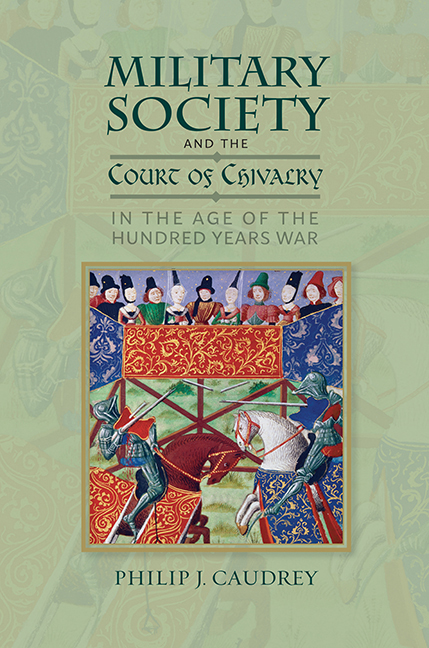Book contents
- Frontmatter
- Dedication
- Contents
- Acknowledgements
- Abbreviations
- Introduction
- 1 Military Service
- 2 Lordship
- 3 Region, Locality and Community
- 4 Soldiers, Civilians and Chivalric Memory
- Conclusion
- Appendix 1 Deponents’ Collective Military Records According to their Own Testimony
- Appendix 2 Lancastrian Retainers: Scrope & Hastings Defendants
- Appendix 3 Plaintiffs’ and Defendants’ Biographies
- Bibliography
- Index
- Warfare in History
- Frontmatter
- Dedication
- Contents
- Acknowledgements
- Abbreviations
- Introduction
- 1 Military Service
- 2 Lordship
- 3 Region, Locality and Community
- 4 Soldiers, Civilians and Chivalric Memory
- Conclusion
- Appendix 1 Deponents’ Collective Military Records According to their Own Testimony
- Appendix 2 Lancastrian Retainers: Scrope & Hastings Defendants
- Appendix 3 Plaintiffs’ and Defendants’ Biographies
- Bibliography
- Index
- Warfare in History
Summary
We saw in the previous chapter that a great many testators before the Court of Chivalry became heavily involved in the Hundred Years War over the course of the fourteenth century. As late as the 1370s and 1380s, numerous witnesses who spoke for Sir Robert Grosvenor and Sir Edward Hastings participated on multiple expeditions, quite often spending more than a decade campaigning at intervals. Although few were still in arms by 1415, their descendants continued upholding their families’ martial traditions to an impressive degree, providing a clear measure of continuity between the war's fourteenth and early fifteenth century phases. One of the more significant structural developments that shaped English armies after 1369 was the evolution of the ‘supersized’ retinue, in which small numbers of magnates contracted with the Crown to bring ever-larger contingents of troops. With Edward III too old, Edward, the Black Prince too ill, and Richard II too young, to personally command the English war effort, the dominant figure in English military society during this epoch was John of Gaunt, Duke of Lancaster. His military retinue became not only the backbone of the English expeditionary forces dispatched across the Channel during the 1370s, but also formed the basis of his private military strength as he sought to acquire the throne of Castile by force in the mid 1380s.
The Lancastrian affinity, with its voluminous documentary records, and with the powerful and controversial figure of Gaunt at its head, has long been a focal point for scholars of later medieval England, and a number of distinguished studies have thoroughly conveyed its significance. With their preponderance of Lancastrian deponents, the bonds respectively enjoyed by Richard, Lord Scrope and the Hastings of Elsing with John of Gaunt have been widely acknowledged. Yet, the intricacies of the Lancastrian affinity's role in Scrope v. Grosvenor and Grey v. Hastings have hardly been the subject of serious scrutiny. This is somewhat surprising, for the wider character of the Lancastrian affinity – as an institution directed from above by Gaunt; as a major employer that drew together hundreds of gentry; and as a creator and reinforcer of inter-gentry solidarity – is indirectly laid bare before the Court, where we essentially encounter it at two distinct moments in its history: on the cusp of Gaunt's Spanish enterprise in 1386, and a near-decade after his death in 1407.
- Type
- Chapter
- Information
- Publisher: Boydell & BrewerPrint publication year: 2019



